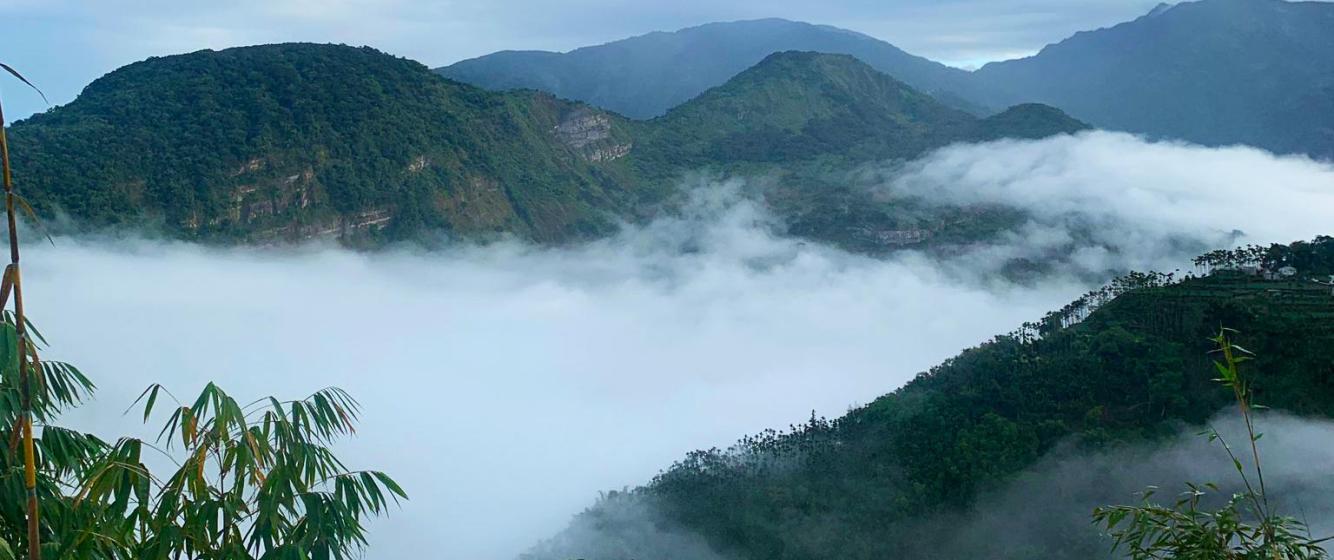
The Mountains Where I Call Home and Grow Tea and Coffee
The following narrative was constructed by Isabelle Cockel based on several interviews she conducted with a young tea and coffee farmer in southern Taiwan.
When I lost my grandfather, I knew it was time to go home. When he stopped breathing, I wasn’t there for him – I was trying to catch another train to another meeting point to deliver my second-hand goods to another customer. I could still see him walking behind the bus which drove me to Taipei for my university education. I missed the opportunity to say goodbye to him. Then I thought of my grandmother – she had lost her husband, a man she devoted herself to, as expected in an agricultural society. I wanted to go home for her; she had brought me and my siblings up. I knew I also had to help with my father’s tea plantation before it declined further. Returning home with this most significant decision made in my life, I knew that I was joining a growing number of people who were part of the second generation of farming households. We returned to the villages where we grew up to work with our parents or to take over our family livelihood from them.
We are a farming family in the mountains. My family owns small tracts of land but we also rent lands to grow various crops in order to increase our income. In the 1980s, when the Taiwanese economy was booming, tea plantations were introduced by the government to farmers because of their potential for income generation. Teas growing in moist hills at a high altitude can produce leaves with a refreshing fragrance and a lingering sweetness if they are picked at just the right time and then roasted. Such tastes are highly appreciated by high-end consumers. My grandparents used to grow mushrooms and other cash crops before they settled upon the tea plantation, and my father carried it over.
The fact that our village is in the mountains gives our teas a niche in the market. More and more families like us established tea plantations, and a tightly knitted tea grower community was formed to tap into this rapidly expanding market. There are several actors in this community, and some of them have overlapping identities. Landowners lend various sizes of land to tea farmers, who, like us, may also own their own lands. Local agrochemical suppliers in the neighbourhood do not only supply farmers with pesticides and fertilisers; they also feed them with ‘knowledge’ about the application of these chemicals to the soil and plants. Nurseries run by local branches of the Council of Agriculture research the crop; they also provide technical support and consultation on the application of pesticides and fertilisers. Roasters, who may be tea growers themselves, receive freshly collected tea leaves from farmers and turn them into final products ready for the market. Farmers’ Associations (FAs) organise competitions and recruit judges – elite tasters who may be experienced roasters – to evaluate teas submitted by farmers in the region and award them with prestige-conferring titles. Winners then display these titles on the exterior of their house – they serve to show their pride as well as to advertise their wares. These award-winning teas are purchased by FAs immediately after the competition at a fixed high price, sometimes as high as NT$200,000 per kilo (approx. USD $6600)! Also chasing these rare and pricy teas are brokers, who are the intermediaries between farmers like my family and individual consumers or big brands.
An indispensable actor in this community is the tea picker. Tea plantations require a lot of labour input during the seven-month growing season; amongst all the tending and other tasks required, tea picking is probably the most time-sensitive and labour-intensive. To turn their tender tea leaves into cash, skilful and experienced farmers can tell when their teas need to be picked, so tea picking has to, and can be, organised ahead of time to ensure things go to plan.
‘Labour exchange’ (huan gong, 換工) is what tea growers have in their inventory to deal with this challenge. ‘Labour exchange’ is a long existing strategy adopted by rice farmers. The ‘labour’ (gong, 工) refers to the people within a family or a clan; ‘exchange’ (huan, 換) refers to the practice in which these people volunteer to form a work unit. This work unit rotates amongst the farming households that are in need of additional labour during the harvest. In reality, all of us need such help! The reciprocity of this practice means that all of us help out in order to be helped by others. My father fondly remembered how we and our neighbours would sit by the landline telephone, which always occupied a prominent place close to the altar in the living room, waiting with great anticipation for someone to make the call. Suddenly, waves of high-pitched telephone ringing tones would ripple through our quiet mountains in the dark evening. Everyone contacted by this ringing tone was told that it was time to get mobilised and to go to a relative’s plantation to pick leaves for them. Can you imagine the commotion of being part of the tea-picking soundscape! The next morning, at the crack of dawn, scores of tea pickers would arrive at the plantation to pick the freshest leaves: their hands turned these glistening green leaves into gold!
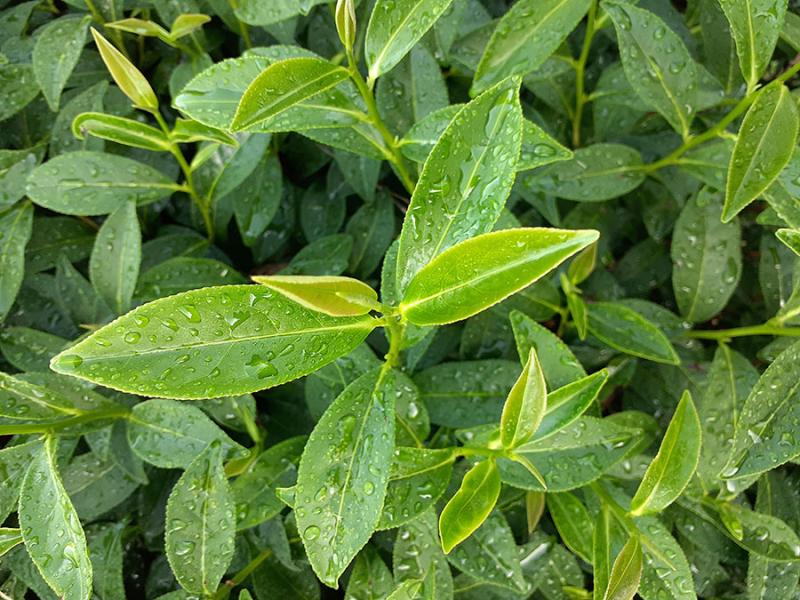
Credit: Isabelle Cockel
Fig. 2: Fresh tea leaves ready to be picked.
A couple of generations back, there were enough people in the villages for this exchange to take place. However, as with other farming households in my village, the number of available people within our own family has reduced. My uncle and aunt ditched the hard labour, which did not necessarily generate an income large enough for everyone in the family, and took up jobs in cities that would pay them a wage entirely earned and retained by themselves. When most uncles and aunts in our village made a similar decision twenty or thirty years ago, and when the people who were still in the villages began to have fewer children, we didn’t have enough people for the exchange of labour. Like other tea growers in our village, my grandfather and my father had to find a solution to this labour shortage. The villagers of my father’s generation began to hire people from neighbouring towns. They did this via a unit leader (ban zhang, 班長), who would gather people together and drive them to the site. Some of them were the farmers’ Southeast Asian wives; a smaller number of them were Indigenous people. Some of these unit leaders also picked teas. Tea pickers were delivered to the site in the early morning to avoid the scorching sun. If it was during the rainy season, this early start to the day was also meant to dodge the downpours that often drenched the mountains in the middle of the afternoon.
Tea pickers came in their full gear. On site, tea pickers wore long-sleeve shirts to cover their arms. The most important piece of their gear was a ‘dou li’ (斗笠), a wide brimmed hat, the outside of which was covered by layered bamboo leaves with a pointed top. Their ‘sunscreen’ wouldn’t be complete if there wasn’t a piece of lightweight cotton cloth draping down from the edge of the brim. They carried a cylinder basket for their leaves, cut by a blade wrapped around their index finger on each hand. The sharpness of the blades helped them remove tender leaves from tea tree branches with precision and speed.
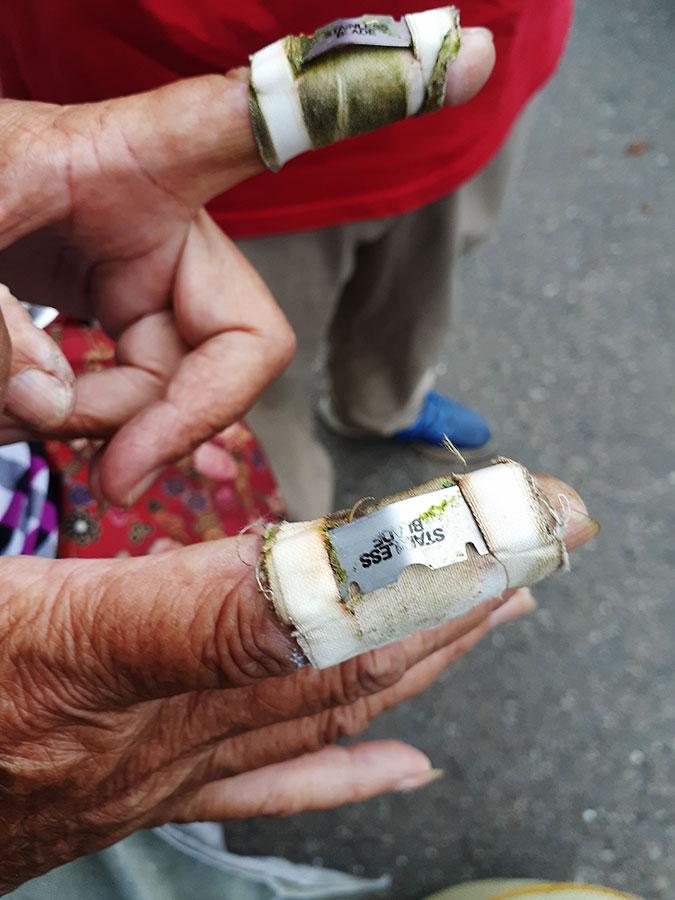
Credit: Isabelle Cockel
Fig. 3: A tea picker’s blades on her index fingers.
Tea pickers took a break every other hour before their harvest became too heavy to be carried on their back. During the break, when they had drinks, snacks, or lunch – often prepared by the farmers as a gesture of their gratitude – their baskets were weighed one by one on a scale on the ground. Carefully watching over the scale was the ban zhang, who entered the amount into his register. Occasionally, tea pickers were caught red-handed – they left a bottle of drink at the bottom of their basket when it was weighed on the scale. They did this because they were paid by weight. My mother was a very skilful tea picker and thirty years ago she could earn more than NT$3000 in a day! After five or six such weigh-ins, it was time to call it a day. Submitting the register to the farmer, the ban zhang collected the farmer’s payment and distributed it to the tea pickers according to their recorded weights. In this way, these ‘external’ tea pickers became the labour ‘exchanged’ amongst farmers. They were called on by one farmer after another.
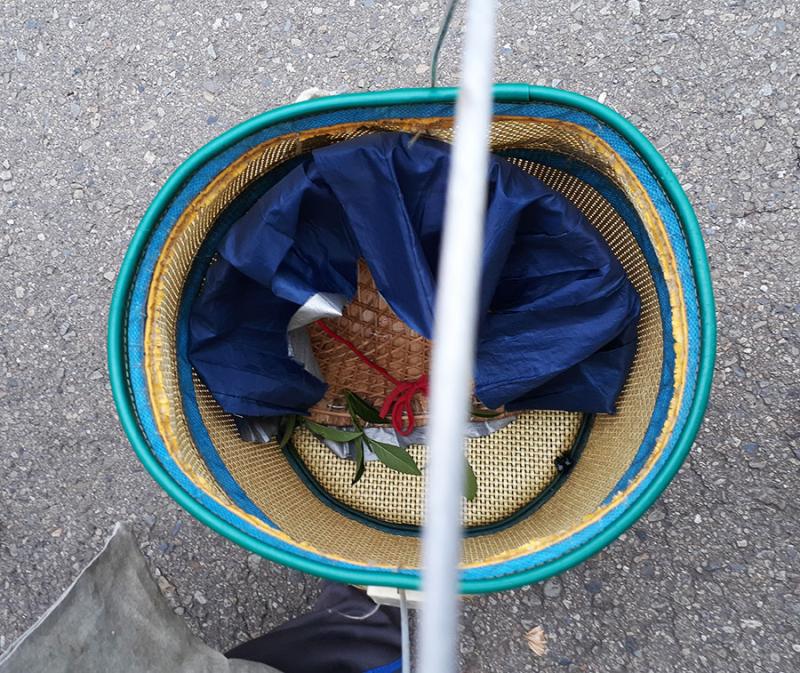
Credit: Isabelle Cockel
Figure 4: A tea picker’s basket.
But they were getting old. Tea picking was not kind to their backs and knees; replacements had to be found. Tea picking by machines has been on trial with varying degrees of success. The villagers have most recently been using the labour of undocumented migrant workers. I’m not sure how it started, but more and more ban zhangs delivered teams made up of undocumented workers; sometimes ban zhangs themselves were also undocumented workers. Undocumented tea pickers tend to be of the same nationality. Tea pickers usually work in pairs; often pickers in a pair are each other’s soul mate. They chat through rows and rows of tea trees as the baskets on their backs becomes heavier and heavier. It would be terribly boring if they couldn’t understand each other’s language! Some of them stay in the mountains, often living in disused containers, which may have been purchased by farmers. These people have become the exchanged labour in our village. In fact, they have become a standby labour supply. We see them passing through on their electronic scooters; there are notices written in Vietnamese and Indonesian about recycling at rubbish collection points on the roadside. They are not short of employment because there is so much farmers have to do all year round. If it’s not about tea, there is a whole range of vegetable and fruit farmers who benefit from hiring them. If it’s not about farming, there are odd jobs like road maintenance or repair or neighbourhood cleaning that our village or township will pay them to do. In that sense, they are also hired by the public sector. No wonder my neighbours often say ‘we farmers can’t survive without undocumented workers!’ We rely on them so much so that when my grandmother passed away, we hired them to dig her grave and to carry her coffin on her last journey from our home to her eternal rest.
Although I came home for my father’s tea business, I’m now also managing our coffee farm. Coffee plantations in Taiwan started during the colonial era. However, they didn’t seem to take off, and eventually died out. They made a return 30 years ago, and by the time I became a coffee farmer and later a professional barista, the size of the coffee plantations in our mountains had expanded significantly, particularly during the past five years. Similar to vegetable, fruit, and tea farmers, coffee farmers like myself either own or rent lands no larger than 0.1, 0.2, or 0.3 hectares. The aggregated costs of land rent, labour, pesticide, fertiliser, harvesting, cleaning, grinding, roasting, and packaging make the coffee beans produced in Taiwan six times more expensive than imported coffee beans. Coffee harvesting is like tea picking in that it also relies on careful hand-picking. Therefore, undocumented migrant workers are sometimes also hired by coffee farmers.
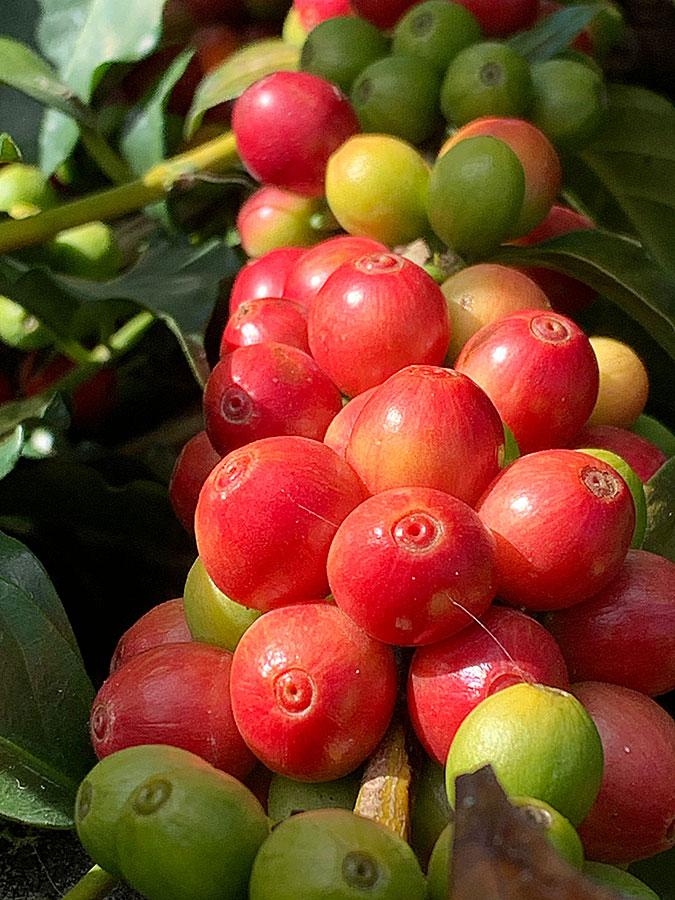
Credit: The interviewed farmer
Fig. 5: Coffee fruits.
Grown at a small scale with such a high cost, our coffee competes in a very small domestic market which is separate from markets involving big brands, imported beans, chain stores, or convenience stores like 7/11. To establish ourselves as a leading bean supplier in this small connoisseur-focussed market, only the crème de la crème can survive! But quality is not everything. Beverages are not always seen as essential food items, and there are plenty of other options for consumers. Coffee farmers like myself have to try to increase our added value.
Obtaining certification for the quality of our coffee is one of the ways in which we can stand out from the crowd. Like tea competitions, there are numerous contests for baristas. What is different, though, is that there is an internationally established set of criteria against which our coffees are judged. Trained judges apply criteria concerning colour, acidity, body, fragrance, and taste to our coffee and judge it according to how our coffee is roasted and brewed. Only mastering the skills of roasting and brewing can bring out the best qualities of theoffeee! Just as a tea ceremony can feel philosophical, Zenist, or therapeutic, coffee brewing can create a ritualistic ambiance for our customers to enjoy, and can enhance their appreciation of our coffee.
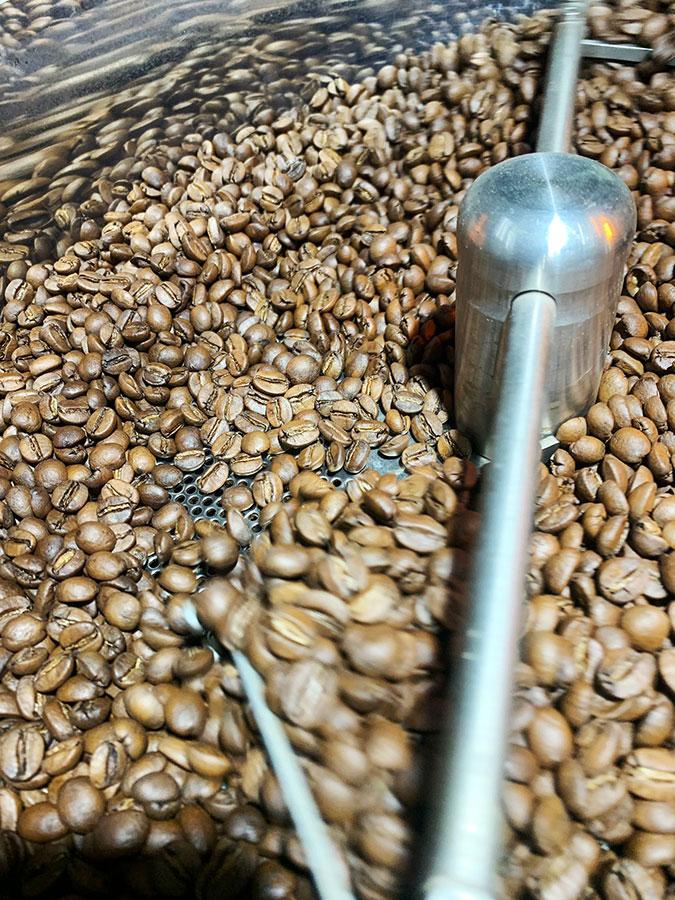
Credit: The interviewed farmer
Fig. 6: Coffee beans in a roasting machine.
Another way to elevate the quality of our product is to go organic, but this is very challenging. Tea and coffee are such high maintenance cash crops that farmers can easily develop a habitual reliance on a high dosage of pesticide and fertiliser. However, unlike most farmers of our father’s generation, we young farmers are willing to break away from this conventional farming practice, known as ‘guan xin nong fa’ (慣行農法) amongst farmers. After all, we return home not only to adopt a challenging livelihood, but also to care for the place that brought us up. The mountains were our playground; the sounds of birds and insects chirping made up the lullabies that sent us to sleep. When there are so few people remaining in our village and the majority of them are way above middle-aged, it is our duty of care to look after our land. If we can’t go organic overnight, there are other more environmentally friendly options that we are willing to try and have been trying. The knowledge about the doses, frequencies, and types of chemical interventions and, mostly importantly, their sale, are largely monopolised by the agrochemical industry. Such monopolies have to be challenged before we lose more of our childhood memories to the agrochemical industry’s interest in making profits.
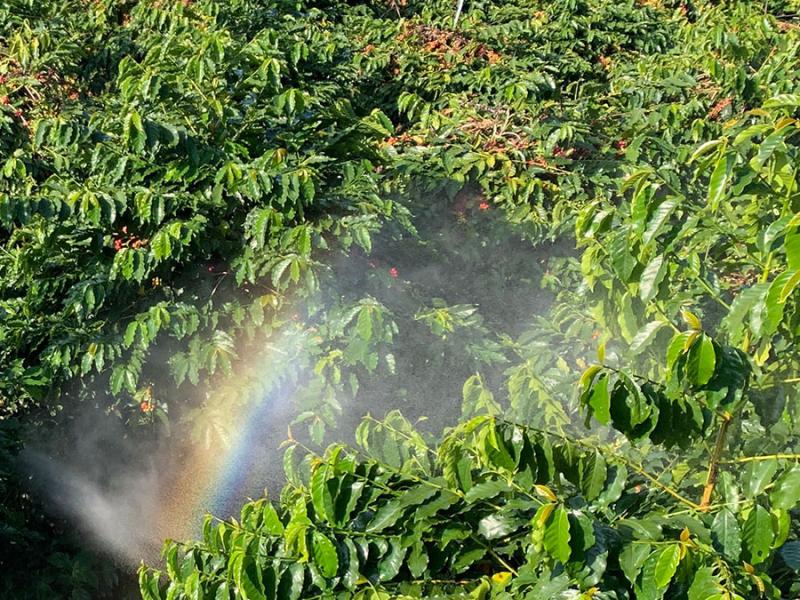
Credit: The interviewed farmer
Figure 7: Coffee trees.
To revitalise our village, we are also keen to develop tourism, but we are very aware that over-development can do as much damage as these chemical products. We hope that when tourists come to enjoy what our village can offer, they know that they share the duty of care for our home. Our village is part of their experiences and their experiences are our economy. The two can be in harmony as long as we, and they, know that the land they step on is our home and that it needs everyone’s care. It’s not difficult to be ethical consumers. After all, neither they or we own the blue skies, the crisp air, the cotton clouds, and the waterfalls that produce a harmony orchestrated with the sounds of birds, insects, and wind. The green mountains are where all things grow; this is where we and the endemic wildlife call home. The mountains have nurtured generations before us. We need to protect them so that they can nurture more generations to come.
Add new comment